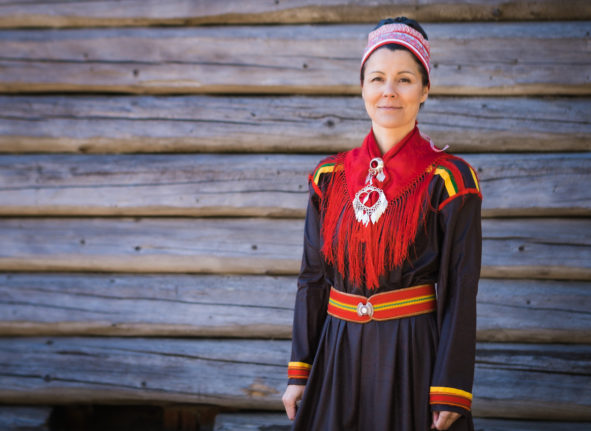Before national borders were drawn in the Nordics, Sami hunters and fishers populated the area now known as Sápmi, and Sami National Day has become an important annual event for the celebration of Sami cultural traditions.
The date was chosen to mark the occasion of the first Sami Congress, held in Trondheim, Norway, in 1917 and reflects a desire among Sami communities for greater self-determination.
An estimated 20,000-40,000 Sami live in Sweden (the figure is uncertain since Sweden doesn’t gather data on ethnicity) and Sami languages are spoken across the region. A Sami parliament was established in 1993 to represent the interests of the Sami, who are one of the country’s five official minorities.
Charlotta Svonni lives with her family in Umeå but is originally from Kiruna in the far north and belongs to the Sami village Laevas.
She recently completed a doctoral thesis on the ‘nomad schools’ instituted by Sweden to educate the children of reindeer herding Sami families and is well-versed in the colonisation and discrimination faced by the Sami over the centuries.
“If we start with the 1600s, the Sami religion was viewed as pagan and the crown wanted the Sami to be Christians,” she says. “Also, the crown wanted the Sami to pay taxes so that they could claim the land.”
In the decades that followed, Sweden encouraged more and more settlers to move north, dangling tax exemptions and freedom from conscription as very attractive incentives, she adds.
Relations between the Swedish authorities and the Sami frayed further as the nationalist ideologies proliferating in Sweden and elsewhere in Europe in the 19th century brought with them notions of racial supremacy.
“They viewed the Sami as belonging to a lower form of culture and that they were not able to take care of themselves. The view from the majority perspective, or the crown, was that if Sami people didn’t work with reindeers, they would die, they wouldn’t be able to live in Swedish society.
“But this was not for all Sami. One really important thing is that the crown of Sweden only wanted to preserve the reindeer herders that were in the mountain region, that were called the nomads.”
Sweden’s increasingly strict definition of the Samis’ role in society led to an exotification and segregation of the indigenous population, Svonni says. The mountain reindeer herders were expected to always wear traditional clothing and live a nomadic lifestyle in traditional tents, or kåtor. By contrast the forest-dwelling reindeer herders and other Sami were to be assimilated into Swedish society.
The nomad schools – boarding schools created for Sami children – further solidified this segregation, she says.
“They were not allowed to go to schools with the Swedes. They were not allowed to go to schools with other Sami people. So these reindeer herders went to the nomad school. This was created in 1913, around the same time period as the Racial Biology Institute, which was created in 1922. These were the kind of ideas flourishing in Sweden.”
Her voice cracks as she recalls a dark period of overt racism that affected many Sami, including her own family.
Svonni recommends anyone interested in this period to watch the 2016 film Sameblod (Sami Blood). The film tells the story of a girl attending a nomad school who, like many other Sami at the time, was subjected to degrading experiments at the hands of the Uppsala-based institute.
The nomad schools were finally shut down in 1962.
While relations with the state have improved immeasurably since the 1930s, Svonni says that “extractivism on Sami land” remains a central area of conflict.
“Just take all the mines. You have this big state company, LKAB, that’s situated in Kiruna, and there are always problems with that. You have this issue with Rönnbäcken in Tärnaby, if they are allowed to mine there or not. You also have the windmill parks and forestry. These are all big state companies but they don’t regard the Sami village or the reindeer husbandry people’s voice in this.”
Her claim is backed up by the fact that United Nations experts routinely chastise Sweden for its failure to adequately involve its indigenous population in consultation processes. But this criticism is also grounds for cautious optimism, says Svonni.
“I see some steps that are going in the right direction, and that is also due to the global indigenous issues moving forward. This puts pressure on Sweden, so I think it will become better in the future.”
A ‘truth commission’ established by Sweden to investigate abuses against the Sami is expected to present its findings in late 2025.
Hear more from Charlotta Svonni in the latest episode of The Local’s Sweden in Focus podcast.



 Please whitelist us to continue reading.
Please whitelist us to continue reading.
Member comments